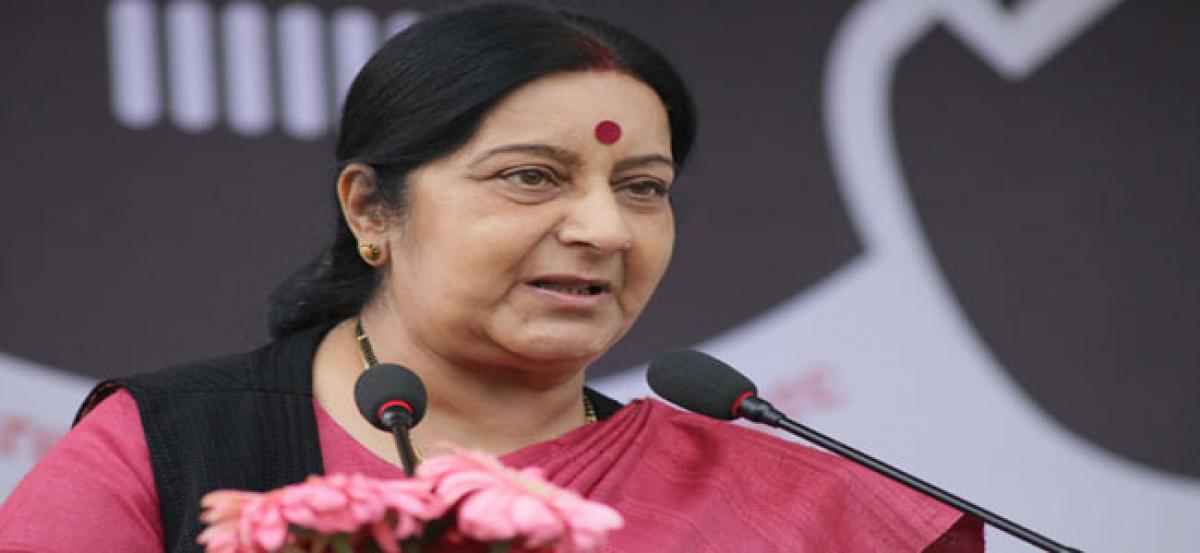Live
- Over 7,600 Syrians return from Turkiye in five days after Assad's downfall: minister
- Delhi BJP leaders stay overnight in 1,194 slum clusters
- Keerthy Suresh and Anthony Thattil Tie the Knot in a Christian Ceremony
- AAP, BJP making false promises to slum dwellers for votes: Delhi Congress
- 'Vere Level Office' Review: A Refreshing Take on Corporate Life with Humor and Heart
- Libya's oil company declares force majeure at key refinery following clashes
- Illegal Rohingyas: BJP seeks Assembly session to implement NRC in Delhi
- Philippines orders full evacuation amid possible volcanic re-eruption
- Government Prioritizes Welfare of the Poor, says Dola Sri Bala Veeranjaneyaswamy
- Two Russian oil tankers with 29 on board damaged due to bad weather
Just In

There is no quid pro quo with China on the issue of \"sufferings\" of the Tibetan people and stapled visas being given to Arunachal Pradesh residents by Beijing, government said on Thursday.There is no quid pro quo with China on the two issues, External Affairs Minister Sushma Swaraj told the Rajya Sabha replying to questions on the two issues.
NEW DELHI: There is no quid pro quo with China on the issue of "sufferings" of the Tibetan people and stapled visas being given to Arunachal Pradesh residents by Beijing, government said on Thursday.There is no quid pro quo with China on the two issues, External Affairs Minister Sushma Swaraj told the Rajya Sabha replying to questions on the two issues.
Highlights:
- Responding to issue of stapled visa to Arunachal residents by China, she said "the issue has been raised in every bilateral meeting at various levels".
- On the issue of Tibet, the minister said "We are not sitting as a mute spectator. Whenever there are differences, we raise them."
Responding to supplementaries on the issue of stapled visa to Arunachal residents by China, she said "the issue has been raised in every bilateral meeting at various levels, be it at my level or that of the Prime Minister. The issue has been raised by us."
Asked about India's stand on Tibet, she said "we used to earlier talk of One China policy, but we used to say that Arunachal Pradesh is an integral part of India. And when we say that, we want that China should also recognise this. Our policy has been made very clear."
On the issue of whether India remained a mute spectator towards the alleged atrocities in Tibet, the minister said "We are not sitting as a mute spectator. Whenever there are differences, we raise them."She said the Dalai Lama wanted to visit Tawang and "we allowed him to do so". This is not the first time but the fifth or sixth time that he is visiting that place.
"Whatever issue that is there that goes against India's interest, we lodge our protest," Swaraj said.
To a question, she said there was no policy under which Chinese companies are denied security permission. She also objected to a member raising the issue of a particular Chinese company in the House.
She said that denial of security permission to one particular company cannot determine the relations between the two countries. She said it done under a process and if a Japanese or a Korean company applied, they get it first.
To another question on the cancellation of a visit of Indian journalists to Tibet by China, Minister of State for External Affairs M J Akbar said there is no official information from China about it."As far as the visit being cancelled, officially we don't have any information. It is between the journalists and the host country," he said.
Akbar said in 2014, when Prime Minister Narendra Modi met President Xi Jinping in Astana, a close development partnership issue was raised and both countries decided to increase people-to-people and media contacts and decided to do everything to bring the two countries together.
"We will continue to make such efforts and take them forward," he said, adding that a high-level media forum has been established to further strengthen media exchanges. The last meeting of this media forum was held in Beijing in February 2015.
"Government has no details of such a visit because the government was not approached by the host agency or the journalists for assistance," he said in a written reply.He said Indian journalists are independent and take their decisions independently and it was between them and the Chinese authorities about the visit to Tibet

© 2024 Hyderabad Media House Limited/The Hans India. All rights reserved. Powered by hocalwire.com







